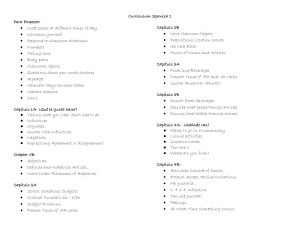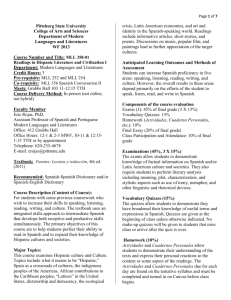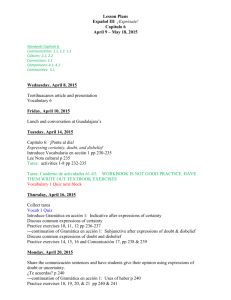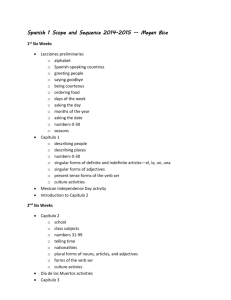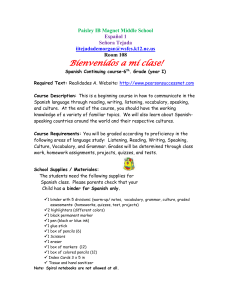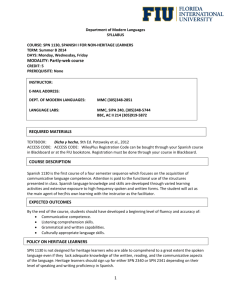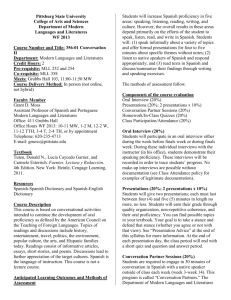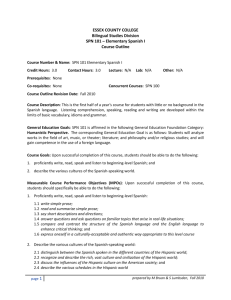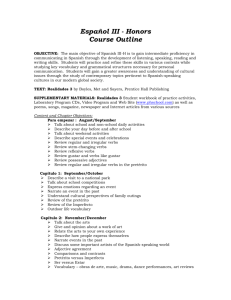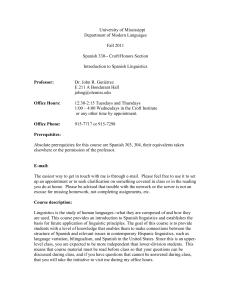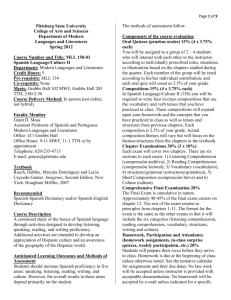Pittsburg State University College of Arts and Sciences Department
advertisement
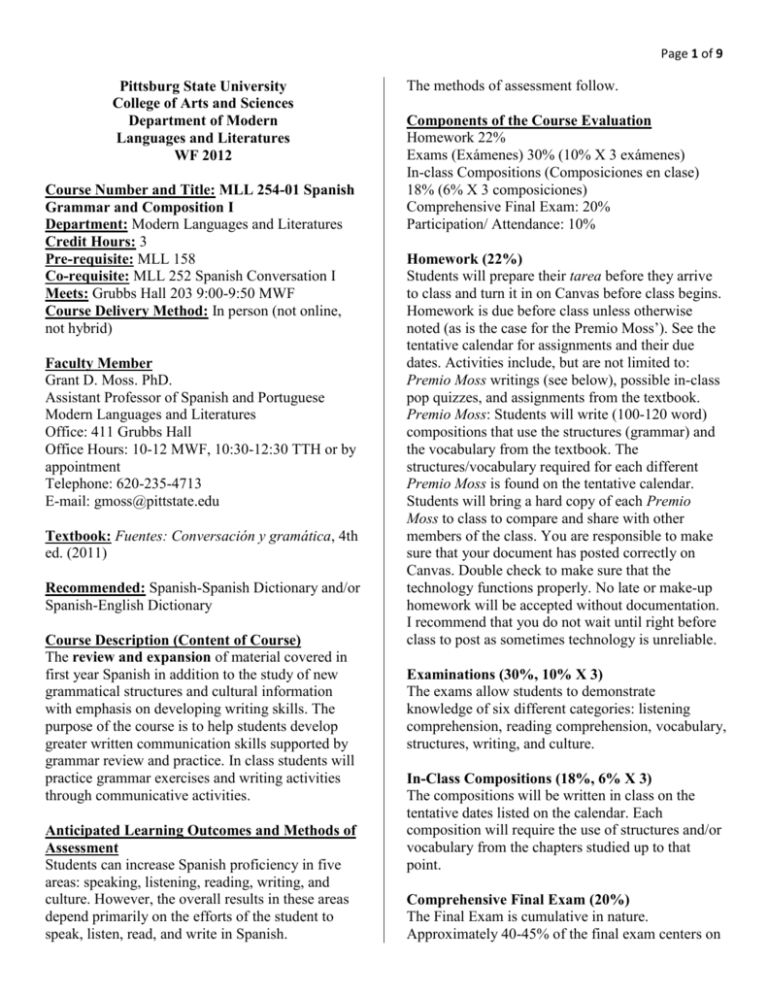
Page 1 of 9 Pittsburg State University College of Arts and Sciences Department of Modern Languages and Literatures WF 2012 Course Number and Title: MLL 254-01 Spanish Grammar and Composition I Department: Modern Languages and Literatures Credit Hours: 3 Pre-requisite: MLL 158 Co-requisite: MLL 252 Spanish Conversation I Meets: Grubbs Hall 203 9:00-9:50 MWF Course Delivery Method: In person (not online, not hybrid) Faculty Member Grant D. Moss. PhD. Assistant Professor of Spanish and Portuguese Modern Languages and Literatures Office: 411 Grubbs Hall Office Hours: 10-12 MWF, 10:30-12:30 TTH or by appointment Telephone: 620-235-4713 E-mail: gmoss@pittstate.edu Textbook: Fuentes: Conversación y gramática, 4th ed. (2011) Recommended: Spanish-Spanish Dictionary and/or Spanish-English Dictionary Course Description (Content of Course) The review and expansion of material covered in first year Spanish in addition to the study of new grammatical structures and cultural information with emphasis on developing writing skills. The purpose of the course is to help students develop greater written communication skills supported by grammar review and practice. In class students will practice grammar exercises and writing activities through communicative activities. Anticipated Learning Outcomes and Methods of Assessment Students can increase Spanish proficiency in five areas: speaking, listening, reading, writing, and culture. However, the overall results in these areas depend primarily on the efforts of the student to speak, listen, read, and write in Spanish. The methods of assessment follow. Components of the Course Evaluation Homework 22% Exams (Exámenes) 30% (10% X 3 exámenes) In-class Compositions (Composiciones en clase) 18% (6% X 3 composiciones) Comprehensive Final Exam: 20% Participation/ Attendance: 10% Homework (22%) Students will prepare their tarea before they arrive to class and turn it in on Canvas before class begins. Homework is due before class unless otherwise noted (as is the case for the Premio Moss’). See the tentative calendar for assignments and their due dates. Activities include, but are not limited to: Premio Moss writings (see below), possible in-class pop quizzes, and assignments from the textbook. Premio Moss: Students will write (100-120 word) compositions that use the structures (grammar) and the vocabulary from the textbook. The structures/vocabulary required for each different Premio Moss is found on the tentative calendar. Students will bring a hard copy of each Premio Moss to class to compare and share with other members of the class. You are responsible to make sure that your document has posted correctly on Canvas. Double check to make sure that the technology functions properly. No late or make-up homework will be accepted without documentation. I recommend that you do not wait until right before class to post as sometimes technology is unreliable. Examinations (30%, 10% X 3) The exams allow students to demonstrate knowledge of six different categories: listening comprehension, reading comprehension, vocabulary, structures, writing, and culture. In-Class Compositions (18%, 6% X 3) The compositions will be written in class on the tentative dates listed on the calendar. Each composition will require the use of structures and/or vocabulary from the chapters studied up to that point. Comprehensive Final Exam (20%) The Final Exam is cumulative in nature. Approximately 40-45% of the final exam centers on Page 2 of 9 chapters 11 and 12. The rest of the exam returns to principles from chapters 1-10. The format for the exam is the same as the other exams in that it will include the six categories (listening comprehension, reading comprehension, vocabulary, structures, writing and culture). Class Participation/Attendance (10%) Students will earn weekly grades for participating in class discussions. Participation is not the same as attendance. If the student attends class but does not participate in the class discussion or in the assigned group work en español (see the Spanish-Only Promise below), he or she will not receive participation credit for that day. Participation points cannot be made-up at a later date due to absence. See Class Attendance and Participation Policy below for more information. Class Attendance and Participation Policy This class includes numerous activities that require you to engage, explore, explain, elaborate, and evaluate. You are expected to be involved and stay involved. Each meeting will add some new dimension to your knowledge of the language and its related cultures. Regular attendance and participation in class activities are essential to be a successful language learner. You must prepare carefully for class, complete all assignments in advance and participate in class. Every day you will receive a grade for individual, pair, and/or group activities. In-class participation en español (see the Spanish-Only Promise) is essential for your success in this class. Come ready to talk about the text for that day! Every day that you do not attend will affect your participation grade because you are not in class to participate! If you do miss a class, makeup work will be permitted only when the instructor is presented with acceptable documentation. Legitimate excused absences include the following: participation in a scheduled activity of an official University organization, verifiable confining illness, serious verifiable family emergencies, subpoenas, jury duty, and military service. It is your responsibility to notify your instructor of any excused absence as far in advance as possible. Makeup work must be made up in a timely manner (e.g. before the next scheduled evaluation). Documentation for excused absences must be presented as soon as possible. No documentation (and by extension no make-up work) will be accepted after the last day of regularly scheduled classes. After three absences, each additional undocumented absence will result in a two (2) point reduction of your final grade per absence, i.e., two (2) unexcused absences (beyond the two “grace” days) will reduce your final grade by 4 points. For example if your overall average is 93% and you have five unexcused absences your final grade will be 89%. Absences are counted from the first day of the quarter. Chronic lateness to class will also reduce your grade. Three tardies equal one absence. The instructor will not drop students from this course for nonattendance or excessive absences. If you do not attend class or have excessive absences you should consider withdrawal from the course or should consult with the various offices on campus. Grading Scale A = 90-100% B = 80-89% C = 70-79% D = 60-69% F = 0-59% Spanish-Only Promise “I _______________ (insert your name here) solemnly promise to speak Spanish and only Spanish during class. For I know that proficiency depends on me; I must take responsibility for my own learning and I must speak, listen, read, and write in Spanish in order to improve my skills.” Signed ___________________ Date_________ Your signature (electronic) Sign the promise electronically on Canvas before the second day of class. E-mail policy The instructor may communicate with you through Pittsburg State e-mail and/or Canvas. You should check your Pitt State e-mail/Canvas frequently for updates from the instructor. The instructor will check his e-mail at least once daily during regular business hours (from Monday to Friday) and he will usually respond to any e-mail inquiries within 24 hours. If you have questions about what the homework is, you should ask a classmate or check the calendar just in case our e-mail checks do not Page 3 of 9 coincide! No assignment will be accepted through e-mail unless otherwise indicated. Study Abroad! The department strongly recommends that all Modern Languages and Literatures majors and minors participate in accredited study abroad programs. PSU offers study abroad scholarships as well as assistance with other financial aid. To learn about accredited programs, contact Megan Corrigan, Study Abroad Coordinator, at 235-4221 or visit 118C Whitesitt Hall. For information on transfer credits, consult with Judy Berry-Bravo, Chair of Modern Languages and Literatures, at 235-4708 or visit 429 Grubbs Hall. Student Conduct Code According to the Student Conduct Code, “Disruption of classes, seminars, research projects, activities or operations of the University” (http://www.pittstate.edu/audiences/currentstudents/policies/rights-and-responsibilities/studentconduct-code.dot) will not be tolerated. This instructor does not permit the use of cell phones or other electronic devices in class unless otherwise indicated. Exceptions will be made for assistive technologies for the vision-or hearing-impaired in consultation with the Center for Student Accommodations. Center for Student Accommodations If you feel that you may need an accommodation based on the impact of a disability, you should contact your instructor privately to discuss your specific needs. Students with disabilities that have been certified by the Center for Student Accommodations will be appropriately accommodated, and should inform the instructor as soon as possible of their needs. The Center for Student Accommodations is located in the Bryant Student Health Center, telephone 620-235-4309. Retro-credits The Department of Modern Languages and Literatures has a retro-credits program designed to reward students who have already spent years learning languages in high school. Students must sign up for the program in 428 Grubbs Hall with Kathy Dyer, Departmental Secretary, during the first three weeks of the semester in which they take their first language course at PSU. That course determines their entry level and the maximum credits they can earn through retro-credits. For more information on retro-credits visit our webpage at www.pittstate.edu/flang. Transfer students who took language courses at another university or college are not eligible. The Department encourages students to seek faculty advice to determine their best entry level. Ike Certificate This course may count towards the academic component of the IKE Certificate of International Knowledge and Experience. The IKE Certificate may be earned by students in any major. The academic component consists of five courses - two semesters of a foreign language, and three courses with international content in three different disciplines. To receive the certificate, students must also complete a second component, either by studying abroad, or by participating in co-curricular activities on campus. Completion of the IKE certificate as an undergraduate is noted on a student’s PSU undergraduate transcript, although graduate students may also earn the certificate. To be added to the IKE Canvas group and start tracking your progress towards the certificate, please e-mail your GUS number in a request to ike@pittstate.edu. More information on the IKE program is available online at http://www.pittstate.edu/department/ike/internationa l-knowledge-and-experience/index.dot. Linguafolio Linguafolio is an assessment tool that encourages students to recognize and record their proficiency level at various times during their study of a foreign language. The program encourages each student to create a personal checklist; this list helps the student to focus on the skills that he/she must develop in order to achieve a higher level of proficiency. If used appropriately, this tool can increase a student’s ability to identify his/her strengths and weaknesses in the language in order to improve. For more information see your instructor or the Canvas page for our course. ACTFL (American Council on the Teaching of Foreign Languages) 2012 Proficiency Guidelines Speaking Writing, Listening and Reading Page 4 of 9 http://www.actfl.org/files/public/ACTFLProficiency Guidelines2012_FINAL.pdf Spanish Table Mondays 12:00-1:00 at Gorilla Crossing Other important Pittsburg State information See the end of this syllabus (after the tentative calendar) for other pertinent information or visit http://www.pittstate.edu/dotAsset/eef4b5e9-426143dc-913b-2be85609cbeb.pdf Tentative Course Calendar (Subject to change) Semana 1 20 de agosto En clase: Introducción al curso; Capítulo preliminar: La vida universitaria Tarea: Study the syllabus and complete the syllabus quiz on Canvas; use your syllabus to do it! Finish the syllabus quiz before the beginning of our next class. Read and sign the Spanish-Only Promise on Canvas before next class. Estudiar capítulo 1 22 de agosto En clase: Capítulo 1: Nuestras costumbres Tarea: Entregar Actividad 4 (pp. 46-47), Actividad 15 (p. 55), Actividad 24 (p. 62) en Canvas, estudiar capítulo 2 24 de agosto En clase: Capítulo 2: España pasado y presente (pluperfect) Tarea: Premio Moss I (include vocabulary and principles from pp. 45-55, 61, 71, 90-91); estudiar capítulos 3-4 Semana 2 26 de agosto En clase: Entregar Premio Moss I; Capítulo 3: La América precolombina y Capítulo 4 Llegan los inmigrantes Tarea: Estudiar capítulos 1-4 para la composición I 28 de agosto En clase: COMPOSICIÓN 1 Tarea: Estudiar Capítulo 5; Entregar Actividad 5 (p. 136) en Canvas 30 de agosto En clase: Capítulo 5 Tarea: Entregar Actividad 18 (p. 146) en Canvas Semana 3 3 de septiembre: Labor Day, no hay clase 5 de septiembre En clase: Capítulo 5: Los Estados Unidos: sabrosa fusión de culturas (Commands, p. 141-146) Tarea: Premio Moss II (include vocabulary and principles from pp. 134-135, 139, 141-144, 153) 7 de septiembre En clase: Entregar Premio Moss II; Repasar para el examen I Tarea: Estudiar para el examen I Semana 4 10 de septiembre En clase: EXAMEN I (Capítulo PreliminarCapítulo 5) Tarea: Estudiar Capítulo 6; Entregar Actividad 4 (p. 166), Actividad 10 (p. 171), Actividad 17A (177178) en Canvas 12 de septiembre En clase: Capítulo 6: Nuevas democracias (Present Perfect Subjunctive 169; por vs. para 183-184) Tarea: Premio Moss III (Include vocabulary and principles from pp. 164-165, 169, 176-177, 183184) 14 de septiembre En clase: Entregar Premio Moss III; Capítulo 6: Nuevas democracias, Present Subjunctive (pp. 176177), por vs. para (pp. 183-184) Tarea: Estudiar capítulo 7; Entregar Actividad 16A (p. 207) en Canvas Semana 5 17 de septiembre En clase: Capítulo 7: Nuestro medio ambiente; Sub. y Adj Clauses (pp. 204-205) Tarea: Entregar Actividad 20A (p. 211) en Canvas 19 de septiembre En clase: Capítulo 7: Nuestro medio ambiente; Sub y Adv Clauses (pp. 210-211) Page 5 of 9 Tarea: Premio Moss IV (Include vocabulary and principles from pp. 195-196, 200-201, 204-205, 210-211) En clase: EXAMEN II Tarea: Estudiar capítulo 9; Entregar Actividad 11A (p. 262) y Actividad 13 (p. 263) 21 de septiembre En clase: Entregar Premio Moss IV; Capítulo 7: Nuestro medio ambiente; Sub y Adv Clauses (pp. 210-211), double object pronouns (p. 214) Tarea: Entregar Actividad 28B (pp. 217-219) en Canvas 10 de octubre En clase: Entregar Actividad 11A (p. 262), Actividad 13 (p. 263); Capítulo 9: Es una obra de arte (the Imperfect Subjunctive, p. 259) Tarea: Premio Moss VI (Include vocabulary and principles from pp. 254-255, 259-260 Semana 6 24 de septiembre En clase: Capítulo 7: Nuestro medio ambiente; Sub y Adv Clauses (pp. 210-211), double object pronouns (p. 214) Tarea: Estudiar para la composición 2 (Capítulos 6 y 7). 12 de octubre En clase: Entregar Premio Moss VI; Capítulo 9: Es una obra de arte; Imperfect Subjunctive (p. 259) Tarea: Entregar Actividad 16 (p. 264) en Canvas 26 de septiembre En clase: COMPOSICIÓN 2 Tarea: Estudiar capítulo 8; Entregar Actividad 11A (p. 232) en Canvas 28 de septiembre En clase: Capítulo 8: Hablemos de trabajo; Sub in Adv Clauses (p. 231) Tarea: Entregar Actividad 14 (p. 234) en Canvas Semana 7 1 de octubre En clase: Capítulo 8: Hablemos de trabajo; o o, ni, ni ni siquiera (p. 239), reported speech (p. 235) Tarea: Entregar Actividad 16 (p. 236) en Canvas 3 de octubre En clase: Capítulo 8: Hablemos de trabajo; o o, ni, ni ni siquiera (p. 239), reported speech (p. 235), Describing Reciprocal actions (pp. 242-243) Tarea: Premio Moss V (Include vocabulary and principles from pp. 227-228, 231-232, 239, 242243) 5 de octubre En clase: Entregar Premio Moss V; Repaso para examen II Tarea: Estudiar Para el examen II Semana 8 8 de octubre Semana 9 15 de octubre En clase: Capítulo 9: Es una obra de arte Tarea: Entregar Actividades 19 y 20 (p. 268) en Canvas 17 de octubre En clase: Capítulo 9: Es una obra de arte Tarea: Premio Moss VII (Include vocabulary and principles from pp. 267-268) 19 de octubre En clase: Entregar Premio Moss VII; Capítulo 9: Es una obra de arte Tarea: Entregar Actividad 23A (p. 271) en Canvas Semana 10 22 de octubre En clase: Capítulo 9: Es una obra de arte; Using the Infinitive (p. 269), expressions with por (p. 271) Tarea: Premio Moss VIII (Include vocabulary and principles from pp. 269-270) 24 de octubre En clase: Entregar Premio Moss VIII; Capítulo 9: Es una obra de arte; Using the Infinitive (p. 269), expressions with por (p. 271) Tarea: Estudiar para la composición 3 26 de octubre: Vacaciones de otoño; no hay clase Semana 11 29 de octubre En clase: COMPOSICIÓN 3 Page 6 of 9 Tarea: Estudiar capítulo 10, Entregar Actividad 6 (p. 282) en Canvas 31 de octubre En clase: Capítulo 10: Las relaciones humanas; future (p. 281), conditional (p. 284) Tarea: Premio Moss IX (Include vocabulary and principles from pp. 281, 284) 2 de noviembre En clase: Entregar Premio Moss IX; Capítulo 10: Las relaciones humanas; future (p. 281), conditional (p. 284) Tarea: Entregar Actividad 22 (p. 295) en Canvas Semana 12 5 de noviembre En clase: Capítulo 10: Las relaciones humanas; si clauses (p. 294) Tarea: Entregar Actividad 27A (p. 297) en Canvas 7 de noviembre En clase: Capítulo 10: Las relaciones humanas; si clauses (p. 294) Tarea: Premio Moss X (Include vocabulary and principles from pp. 289-290, 294) 9 de noviembre En clase: Entregar Premio Moss X; Capítulo 10: Las relaciones humanas; si clauses (p. 294) Tarea: Estudiar para el examen III En clase: Entregar Premio Moss XI; Capítulo 11: Sociedad y justicia (Conditional Perfect) Tarea: Estudiar Capítulo 11 21 de noviembre: Vacaciones del día de acción de gracias, no hay clase 23 de noviembre: Vacaciones del día de acción de gracias, no hay clase Semana 15 26 de noviembre En clase: Capítulo 11: Sociedad y justicia (Future Perfect and Conditional Perfect: Si clauses, p. 317) Tarea: Premio Moss XII (Include vocabulary and principles from pp. 308-309, 314) 28 de noviembre En clase: Entregar Premio Moss XII; Capítulo 11: Sociedad y justicia; Future Perfect and Conditional Perfect: Si clauses (p. 317) Tarea: Entregar Actividad 16 (p. 318) en Canvas 30 de noviembre En clase: Capítulo 11: Sociedad y justicia; Future Perfect and Conditional Perfect, Si clauses (p. 317), como si (p. 318) Tarea: Entregar Actividad 20 (p. 320) en Canvas Semana 13 12 de noviembre En clase: Repaso para el examen III Tarea: Estudiar para el examen III Semana 16 3 de diciembre En clase: Capítulo 11: Sociedad y justicia (Future Perfect and Conditional Perfect: Si clauses 317, como si 318) Tarea: Premio Moss XIII (Include vocabulary and principles from pp. 317-318) 14 de noviembre En clase: EXAMEN III Tarea: Estudiar capítulo 11 5 de diciembre En clase: Entregar Premio Moss XIII; Capítulo 12 Tarea: Estudiar para el examen final 16 de noviembre En clase: Capítulo 11: Sociedad y justicia (Future Perfect) Tarea: Estudiar Capítulo 11, Premio Moss XI (Include vocabulary and principles from pp. 308309, 314) 7 de diciembre En clase: Repaso para el examen final Tarea: Estudiar para el examen final Semana 14 19 de noviembre Semana de exámenes finales Examen Final: Wednesday, December 12th, 2012 9:00-10:50 State Standards: Page 7 of 9 This course addresses the following teaching standards as mandated by the Kansas State Board of Education. When students take this course, they progress towards meeting state standards required for the K – 12 teaching license in Spanish. Teaching Standard # 2 The teacher of a foreign language is proficient in the foreign language Knowledge # 1 The teacher is aware of the levels of proficiency in the basic skills in foreign language and his or her own level Knowledge # 2 The teacher understands the importance of maintaining and advancing his or her own skills. Performance # 5 The teacher can express his or her own ideas on practical, social and professional topics in most formal and informal writing styles in the target language. Performance # 6 The teacher can write most kinds of correspondence, such as memos, social and business letters, short research papers and statements of position in areas of special interest in the target language. Performance # 7 The teacher demonstrates control of a full range of structures, spelling and non-alphabetical symbol production in the target language. Other important Pittsburg State information IMPORTANT DATES 8/20 ...........................................................................................Classes begin 8/27 ...............................................................................................Tuition due 8/27…………………………Last day for full tuition refund if withdrawing 8/27 …………………… Last day to add classes w/o permission of instructor 8/31………………………………....Final day to drop w/o transcript notation 9/3 ......................................................................................Labor Day Holiday 9/17 ......................................................Last day for half refund if withdrawing 10/15 ..................................Mid-term D and F grades available after 5:00 pm 10/25-10/26 .....................................................................................Fall Break 11/5 .............Final day to drop a course unless withdrawing from all classes 11/21 .................................................................Thanksgiving Holiday begins 11/29 .....................................................Last day to withdraw from all classes 12/10 .....................................................................Finals week through 12/14 12/14 ...Deadline to remove/extend IN grades for 2012 SP and SU semester 12/17 ........................................................................Grades due from faculty DROPPING A COURSE OR WITHDRAWING FOR THE SEMESTER Beginning the 12th week through the 16th week of full-term courses, individual courses cannot be dropped. A student who does not officially withdraw from a course or from the university will be assigned an “F” grade in the course or courses concerned. These “F” grades will be included in the computation of the grade point average. The dates for dropping courses that run fewer than sixteen weeks are proportionate to the length of the course (e.g. the last day to drop an eight week course would be the end of the sixth week). Consult your instructor or the Registrar’s Office for questions about a specific course. For students who wish to withdraw from all classes after the 12th week of the term, the instructor must assign a grade of W or F. To drop a course after the 5th day of class or for clarification on drop/add policies, contact the Registrar’s Office, 103 Russ Hall, 620-235-4200 or registrar@pittstate.edu IMPORTANT INFORMATION FOR STUDENTS RECEIVING FINANCIAL ASSISTANCE The Office of Student Financial Assistance is required to recalculate financial aid eligibility for students who withdraw, stop attending or are dismissed prior to completing 60 percent of a semester. This calculation applies to students receiving Title IV funds including: Federal Pell Grant Stafford Loan ACG – Academic Competitiveness Grant SMART Grant for math and science TEACH Grant for education majors Parent PLUS Loan Federal financial aid is returned to the federal government based on the percent of unearned aid disbursed toward institutional charges for tuition, fees, and on-campus room and board. Students may be required to repay a portion of the aid funds received. When aid is returned, the student may owe a debit balance to the University and/or Department of Education Title IV Programs. IMPORTANT INFORMATION FOR INTERNATIONAL STUDENTS International students studying on F or J visas must be in proper immigration status and are required to always be in full time enrollment (minimum 12 hours undergraduate. or 9 hours graduate). For additional information http://www.pittstate.edu/office/international/internationalstudents/ immigration.dot CLASS ATTENDANCE POLICY Students at Pittsburg State University are expected to attend class regularly and participate fully in class activities. It is the responsibility of the course instructor to set the attendance policy for his or her courses and communicate that policy to students in the course syllabus. The syllabus should address whether and how attendance affects the course grade, the issue of excused absences, and whether students will be dropped for nonattendance or excessive absence. Students who have not attended or who have been excessively absent from a class may be dropped from the course by the instructor. In such instances, this policy must be clearly stated in the syllabus and uniformly enforced. Students may be dropped at anytime in the semester based on course policy. Instructor drops after the beginning of the 12th week of a full semester class will result in a grade of “F” for the course. Regardless of the faculty prerogative to drop a student for nonattendance or excessive absence, the ultimate responsibility for monitoring and maintaining up-to-date course enrollment rests with the student. SEVERE WEATHER INFORMATION If forecasts or weather conditions suggest that travel in the area could become hazardous a policy is in place to determine if classes or other University activities will be cancelled. This policy and notification process can be found at http://www.pittstate.edu/office/president/policies/severeweatheremergency-plan.dot Notification methods typically include the PSU website, local news media, and text messaging for those who subscribe to this service. ACADEMIC INTEGRITY POLICY Academic dishonesty by a student is defined as unethical activity associated with course work or grades. It includes, but is not limited to: (a) Giving or receiving unauthorized aid on examinations. (b) Giving or receiving unauthorized aid in the preparation of notebooks, themes, reports, papers or any other assignments. (c) Submitting the same work for more than one course without the instructor’s permission, and, (d) Plagiarism. Plagiarism is defined as using ideas or writings of another and claiming them as one’s own. Copying any material directly (be it the work of other students, professors, or colleagues) or copying information from print or electronic sources (including the internet) without explicitly acknowledging the true source of the material is plagiarism. Plagiarism also includes paraphrasing other individuals’ ideas or concepts without acknowledging their work, or contribution. To avoid charges of plagiarism, students should follow the citation directions provided by the Page 8 of 9 instructor and/or department in which the class is offered. The above guidelines do not preclude group study for exams, sharing of sources for research projects, or students discussing their ideas with other members of the class unless explicitly prohibited by the instructor. Since the violation of academic honesty strikes at the heart of the education process, it is subject to the severest sanctions, up to and including receiving an “F” or “XF” (an “XF” indicates that “F” was the result of academic dishonest) for the entire class and dismissal from the university. For a full copy of this policy see: http://catalog.pittstate.edu/contentm/blueprints/blueprint_display.php?bp_list ing_id=162&blueprint_id=124&sid=1&menu_id=7980 MID-TERM GRADES After the eighth week of the fall and spring semester, mid-semester “D” and “F” grades submitted by faculty are reported by the Office of the Registrar to the dean of the college in which you are majoring. All “D” and “F” grades submitted by faculty will be reported by the Registrar to you and your academic advisor through the on-line student information system (GUS). No mid-semester report of “D” and “F” grades are distributed for the summer session. INCOMPLETE GRADES Incomplete grade may be assigned in rare instances when a student is unable to complete a course due to circumstances beyond his/her control. You must have completed a majority of the coursework to be eligible for this consideration. Unless granted an extension by the instructor, students have only one semester to complete the work. If you feel like you qualify for an Incomplete grade, you should visit with your instructor and not assume an IN grade will be assigned automatically. FINAL GRADE REPORTS Final grades are reported to the Registrar’s Office at the conclusion of the course. You may access your grades in GUS immediately upon grade posting. GRADE APPEALS Final course grades are to be awarded upon criteria communicated to the student at the beginning of the semester. Additional work after a final grade was submitted cannot be used to change the grade. If you believe that an error has been made in the assignment or recording of a final grade, you should first confer with the instructor. If such a conference does not resolve the problem, a grade appeal form must be submitted to the head of the academic department that offers the course in question. This appeal form must be submitted no later than six weeks after the beginning of the fall or spring semester immediately following the semester in which the grade being appealed was received. The appeal form is available online on the Registrar’s Office and Graduate School’s webpage under forms. DEAD WEEK POLICY No tests or major assignments will be presented during the week prior to final examination week, unless identified in the course syllabus presented at the start of the semester. FINAL EXAM SCHEDULE Final examinations will be given according to the schedule of examinations available at http://www.pittstate.edu/office/registrar/final-exam-schedule.dot Pittsburg State administration, faculty, and staff are here to assist you in your academic success. If you have questions or concerns that affect your academic success, it is important that we hear from you. Your Instructor Faculty members usually include their office hours and contact information in the class syllabus. If not, set a time to meet with your instructor by speaking with him/her prior to or immediately following your class session or check with the departmental office for instructor availability. Writing Assistance The Writing Center offers free writing consultations for students at any stage of the writing process for any writing project. Writing Center consultants are experienced writers who are committed to helping you achieve your writing goals. Dr. Don Judd and Dr. Janet Zepernick, Directors, Writing Center Telephone: 620-235-4694 http://www.pittstate.edu/office/writing_center/ Library The Axe Library provides comprehensive services and materials including both physical and online books, periodicals, and interlibrary loan. Also available to students are a computer lab, with color printing, scanning and faxing capabilities. Telephone: 620-235-4880 http://axe.pittstate.edu/ Tutoring Tutoring programs related to general education classes are available. Whether you are studying for a test, writing a paper or preparing a presentation, tutors can help you sharpen your skills and increase your knowledge. If you are struggling with a class, then a tutor can help you get back on track. Use tutoring to get better grades! Ashley Conyers, Student Success Counselor, Student Success Center. Telephone: 620-235-4951 E-mail: aconyers@pittstate.edu http://www.pittstate.edu/office/exploratory-studies/tutoring.dot. Computer/Technology Assistance Gorilla Geeks Help Desk is responsible for assisting students with various technology needs. Services available include help with GUS and GusPINs, PSU email, assistance with campus system problems and support of the campus wireless network. In addition the center will help you with technology needs that are essential for academic success. Services include assistance with educational software packages used on campus including Microsoft OS, Office applications, basic Canvas support and other campus applications; help with computer hardware or software problems; wireless connectivity; and configuring new computers. Gorilla Geeks Help Desk Telephone: 620-235-4600 E-mail: Geeks@pittstate.edu http://www.pittstate.edu/office/gorilla-geeks/ Services for Students with Learning Disabilities Allison Adams, Coordinator, Center for Student Accommodations Telephone: 620-235-6584 http://www.pittstate.edu/office/counseling/center-for-studentaccommodations. dot FINAL EXAM OVERLOAD POLICY If you have three or more final exams officially scheduled for a single day you are entitled to arrange with the faculty member instructing the highest numbered course (the 3 digit number following the department code) a different day for the exam. If two courses have the same number, the course with the lower enrollment would be rescheduled. Students requesting accommodation should submit their request on the form found at http://www.pittstate.edu/office/registrar/forms.dot along with a copy of their class schedule, at least two weeks prior to the beginning of final exam week. The faculty member has until the Monday of pre-finals week to arrange a mutually convenient time for administration of the final exam. If the matter cannot be resolved between student and faculty member, you may take the request to the Office of the Provost, 220 Russ Hall, no later than the Wednesday of dead week. WHERE TO GO FOR ASSISTANCE Services for Students with Physical Disabilities Cindy Johnson, Director, Equal Opportunity/ Affirmative Action Telephone: 620-235-4189 http://www.pittstate.edu/office/eoaa/ Student Health Center Telephone: 620-235-4452 http://www.pittstate.edu/office/health/ University Counseling Services Telephone: 620-235-4452 http://www.pittstate.edu/office/counseling/ General Questions Page 9 of 9 If you have questions about university policies or procedures, need assistance with academic success skills (such as note taking, effective reading techniques, and test taking strategies), or have general questions about your academic progress, Enrollment Management & Student Success can assist or refer you to the appropriate office. Enrollment Management & Student Success Telephone: 620-235-4109 STATEMENT OF NONDISCRIMATION Pittsburg State University is committed to a policy of educational equity. Accordingly, the University admits students, grants financial aid and scholarships, conducts all educational programs, activities, and employment practices without regard to race, religion, color, sex, disability, national origin, ancestry, age, veteran status, sexual orientation, marital status, parental status, gender identity or gender expression.
